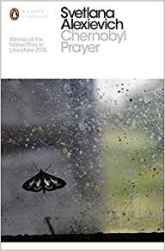Svetlana Alexievich, Chernobyl Prayer (1997, trans Anna Gunin & Arch Tait Penguin Classics 2016)
 From post revolutionary China in Madeleine Thien’s Do Not Say We Have Nothing back to the Russian Revolution in China Miéville’s October, and now forward to post-Soviet Belarus: the book group has lit on a theme.
From post revolutionary China in Madeleine Thien’s Do Not Say We Have Nothing back to the Russian Revolution in China Miéville’s October, and now forward to post-Soviet Belarus: the book group has lit on a theme.
Before the meeting:
Knowing that Chernobyl Prayer is essentially a series of monologues about the aftermath of the 1986 Chernobyl nuclear disaster, I expected it to be a gruelling read, so I rationed it. I worked out how I would need to read seventeen pages a day to finish the book before the Group met, and set that as a schedule. Of course it didn’t work out like that, but it was a good strategy.
As Studs Terkel’s Working did for working people in the USA, or Wendy Loewenstein’s Weevils in the Flour for the 1930s Depression in Australia, this book provides a platform for scores of witnesses who otherwise would be largely ignored or – as a number of Alexievich’s interviewees tell us – treated as specimens. There are peasants and nuclear physicists, loyal Communists and embittered cynics, ancient women and nine year olds, poets, playwrights and journalists. There’s operatic intensity, fatalistic heroism, jokes that are terrible in both meanings of the word. The cultivated and forested land around Chernobyl is lovingly evoked, along with the invisible horror of nuclear radiation. The monologues that pretty much begin and end the book, each titled ‘A lone human voice’, are long, passionate, heartbreaking stories of love and bereavement, one from the widow of a fireman who was among what we now call the first responders, the other from the widow of a clean-up worker who was conscripted for the job six months later.
Here’s an excerpt from the author’s interview with herself early in the book:
This is not a book on Chernobyl, but on the world of Chernobyl. … what I’m concerned with is what I would call the ‘missing history’, the invisible imprint of our stay on earth and in time. I paint and collect mundane feelings, thoughts and words. I am trying to capture the life of the soul. A day in the life of ordinary people. Here, though, everything was extraordinary: both the event itself and the people, as they settled into the new space. How many times has art rehearsed the apocalypse, offered different technological versions of doomsday? Now, though, we can be assured that life is infinitely more fantastical. … Chernobyl is a mystery that we have yet to unravel. An undeciphered sign. A mystery, perhaps, for the twenty-first century; a challenge for it. What has become clear is that, besides the challenges of Communism, nationalism and nascent religion which we are living with and dealing with, other challenges lie ahead: challenges more fiendish and all-embracing, although still hidden from view. Yet, after Chernobyl, something had cracked open.
I’ve responded to works by other Nobel Prize laureates with a kind of compliant respect, ‘I can see why this person was given the Nobel Prize, and I guess my horizons have been expanded by reading this book.’ In the case of Chernobyl Prayer I am deeply grateful that the Norwegians brought it to my attention (and to the Book Group for prompting me to read it). In illuminating the ‘missing history’ of Chernobyl, it reminds us of the disasters, past and in the making, that we so easily turn our heads away from: Hiroshima, Nagasaki, Maralinga, Fukushima, and the overarching threat of climate change. In this way it is like Maralinga: the An̲angu story by the Yalata Aboriginal Community with Christobel Mattingley, or Yhonnie Scarce’s beautiful and unsettling installation Death Zephyr (click for an image). It would be impossible for a reasonably well informed Australian to read this book, especially the sections dealing with the way political pragmatism trumped the laws of physics, without thinking of the pronouncements on coal from Tony Abbott and his ilk.
The meeting: I hosted the meeting this time. I let people know in advance that I had made an enormous amount of marmalade from our cumquat tree this year. One of the chaps emailed on the weekend, ‘The prospect of marmalade is the only thing getting me through this miserable book!’ Others echoed the sentiment.
It turned out that the conversation was so animated that all thought of marmalade vanished from our minds. It’s a perfect book-club book. There is so much detail that the conversation bounced around from one alarming moment to another, as we reminded each other of what we’d read. We were in awe of the author’s skill in getting such poetry down on the page from her interlocutors’ testimonies.
And now a hasty fourteen lines, written before the group met:
November Verse 3: After reading Svetlana Alexievich’s Chernobyl Prayer
(‘I realise now that terrible things in life happen unspectacularly and naturally‘)
Good Soviets, good peasants trusted
authorities that reassured,
a lifetime’s mental habit rusted
on. To keep that Party Card,
to serve the people, serve the nation,
be not afeared of radiation:
in spring the wood’s still gently green,
roengtens, curies can’t be seen.
We have our own insanity
three decades on: the planet warms,
brings bushfires, catastrophic storms,
but ‘Coal’s good for humanity’
wins votes. With luck in time we’ll learn
so millions more don’t have to burn.

